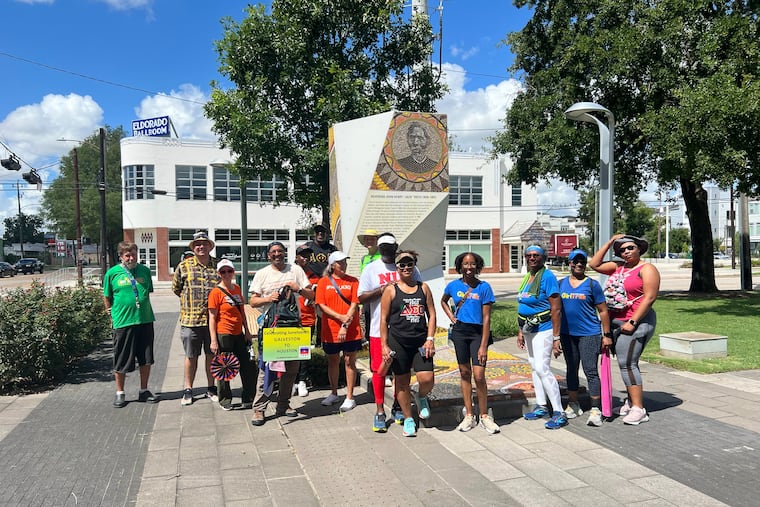Philadelphia’s ‘walking artist’ has arrived in Houston, completing his Juneteenth walk to celebrate freedom
“I definitely could feel a connection to the ancestors,” said Frank E. Thompson Jr., who joined walking artist Ken Johnston on his Juneteenth walk in Texas.

A Philadelphia man completed a 51-mile “walk to freedom,” from Galveston to Houston, Texas, to honor the Juneteenth holiday.
Ken Johnston, who has made several “walks to freedom” in recent years, began his five-day walk on June 19, marking the date in 1865 that a Union Army general arrived in Galveston to tell enslaved Black Americans that they were freed.
Black people in Texas learned this 2½ years after the Emancipation Proclamation freed most enslaved people in Confederate states on Jan. 1, 1863.
Many of the formerly enslaved people fled Galveston and its large plantations and made an “exodus” to Houston, Johnston said. There was another migration of Black people who left small towns and went to Galveston for jobs.
» READ MORE: Philadelphia ‘walking artist’ heads to Texas for 51-mile walk in the state where Juneteenth began
Johnston writes about his walks to preserve civil rights on his “Our Walk to Freedom” blog.
He decided to make the Juneteenth walk in Texas to support the work of historians like Naomi Mitchell Carrier, CEO of the Texas Center for African American Living History, who is leading efforts to have the 51-mile trek from Galveston to Houston declared the Emancipation National Historic Trail.
“This was a very memorable walk,” Johnston said Tuesday. “All the other walks I’ve made were north of the Mason-Dixon Line, with the exception of the Selma to Memphis walk in 2018.
“This walk was about closing that circle of the story. People were not able to emancipate themselves, but lived to see the end of slavery in Texas.”
Johnston arrived in Houston on Sunday at the Texas AIDS Memorial Garden after walking 12 miles that day.
On Monday, accompanied by several Texas residents, Johnston walked two miles to Emancipation Park, a 10-acre park that four Black men, all formerly enslaved, bought for $1,000 in 1872. (Some sources say they bought the land for $800.)
The park was the original site for Juneteenth celebrations in Houston and is the oldest public park in Texas. Later Monday, Johnston walked two additional miles to Freedmen’s Town, a community that Black people fleeing Galveston established in 1866.
Johnston completed the 51-mile walk with his friend, Frank E. Thompson Jr., of Kansas City, Mo. The pair traveled between eight to 16 miles a day, usually walking two times a day, in the early morning and again in the early evening to beat the Texas heat.
Thompson made it to Houston on Sunday but was forced to end his walk shortly after arriving because he developed blisters on both feet severe enough that he was hospitalized. So Thompson, a native Texan, could not complete the four-mile walk that Johnston made to the historic sites on Monday.
Despite his ailments, Thompson said, he was glad he made the walk.
“I definitely could feel a connection to the ancestors,” he said. “It was powerful to understand you are walking and standing in some of the places they once walked and stood.”